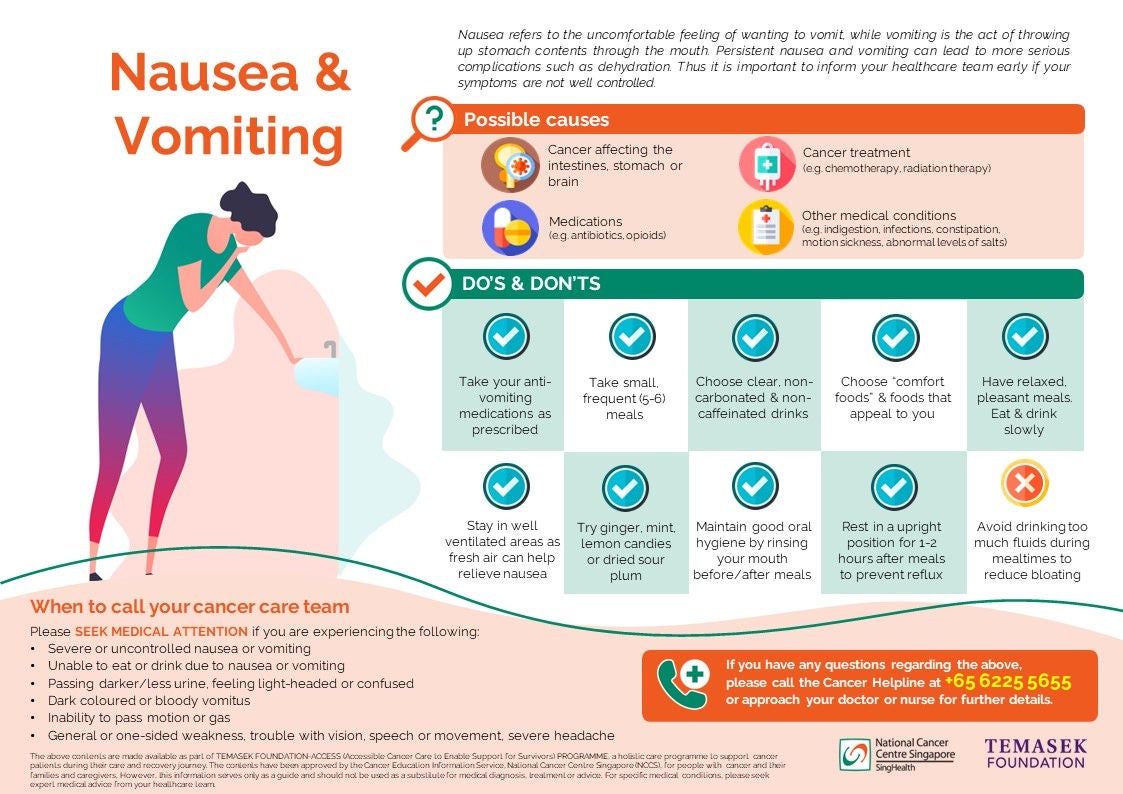National Cancer Centre Singapore will NEVER ask you to transfer money over a call. If in doubt, call the 24/7 ScamShield helpline at 1799, or visit the ScamShield website at www.scamshield.gov.sg.
Nausea and Vomiting
- Allergies
- Appetite Loss
- Bone Problems
- Breathing Problems
- Constipation
- Diarrhoea
- Difficulty Swallowing (Dysphagia)
- Dry Mouth (Xerostomia)
- Difficulty Sleeping (Insomnia)
- Feeling Tired (Fatigue)
- Fevers and Infections
- Hair Loss
- Heart Problems
- Menopausal Symptoms
- Indigestion
- Joint Pains
- Limb Swelling (Lymphedema)
- Muscle Aches
- Nail Changes
- Nausea and Vomiting
- Pain
- Tingling or Numbness in Hands or Feet (Peripheral Neuropathy)
- Skin Changes
- Sore Mouth (Oral Mucositis)
- Taste Changes

Nausea refers to the uncomfortable feeling of wanting to vomit, while vomiting is the act of throwing up stomach contents through the mouth. One of the most common side effects of cancer and certain anticancer treatments is nausea and vomiting, but not all patients with the same condition and/or treatments will experience it the same way. The severity of nausea and vomiting ranges from mild to severe in different people. It can occur before, during or after treatment, but there are also some people who do not experience it at all.
Causes of Nausea and Vomiting
An area in our brain called the “vomiting centre” controls vomiting. Various factors can cause nausea and vomiting by triggering the vomiting centre. These include:
- Anticancer drugs. Certain chemotherapy (e.g. cisplatin, doxorubicin, cyclophosphamide) are more likely to cause nausea and vomiting than others.
- Radiation therapy, especially to the brain / abdominal / pelvic areas, or total body radiation therapy
- Certain medications (e.g. antibiotics, opioids)
- Cancer that is within or has spread to the brain
- Cancer affecting e.g. blocking the gullet, stomach or intestines
- Abnormal body salt or mineral levels
- Other factors that may be unrelated to cancer or its treatment (e.g. indigestion, infections, constipation, motion sickness, food poisoning)
What you need to look out for
Uncontrolled nausea and vomiting can lead to more serious issues like dehydration and other problems from the loss of body salts. It is important to look out for the following symptoms and if present, to see your doctor or nurse early to be assessed.
- Feeling of wanting to vomit that lasts for more than 2 days
- Throwing up for more than twice a day, for more than 2 days
- Difficulty eating or drinking due to nausea and/or vomiting
How it can be treated
Your doctor will ask you further questions (e.g. when it started, associated symptoms) and conduct a physical examination, to determine the cause of your nausea or vomiting. Your doctor may also order for further investigations (e.g. blood tests, scans) if needed. As the treatment for nausea or vomiting depends on its cause, your healthcare team will be able to advise you in detail on the management plan that is most suited to your condition.
Some common treatment approaches include:
- Prescribing anti-vomiting medications that prevents or treats nausea / vomiting
- Treating the condition that causes the nausea / vomiting. For instance, administering an enema to help you pass motion can help relieve nausea / vomiting caused by constipation.
What you can do
The following are some of the do’s and don’ts to help you to manage your nausea and vomiting better:
To prevent nausea / vomiting:
|
|
If your nausea / vomiting is worsened by smells from food or other sources:
|
|
If you feel nauseated:
|
|
When to call your cancer care team
Please inform your doctor or nurse if you experience any nausea and / or vomiting, or if you experience any of the following that can indicate worsening or complications of your condition:
- Nausea / vomiting that does not improve despite anti-vomiting medications
- Signs of dehydration, including weight loss, feeling thirsty or having dry mouth, passing darker / less urine, feeling light-headed, dizzy or confused
- Signs of bleeding in your stomach or intestines, including having vomitus that looks like coffee ground, or has blood in it
- Signs of blockage in your intestines, including inability to pass motion or gas
If you have any questions regarding the above, please call the Cancer Helpline at +65 6225 5655 or approach your doctor or nurse for further details.
Click here to download the PDF version of this article.
如果您要下载本文的中文版本,请点击此处。
Klik di sini untuk memuat turun versi PDF artikel ini.
The above contents are made available as part of TEMASEK FOUNDATION-ACCESS (Accessible Cancer Care to Enable Support for Survivors) PROGRAMME, a holistic care programme to support cancer patients during their care and recovery journey.
The contents have been approved by the Cancer Education Information Service, National Cancer Centre Singapore (NCCS), for people with cancer and their families and caregivers. However, this information serves only as a guide and should not be used as a substitute for medical diagnosis, treatment or advice. For specific medical conditions, please seek expert medical advice from your healthcare team.
Brought to you by:
Keep Healthy With
© 2025 SingHealth Group. All Rights Reserved.

















